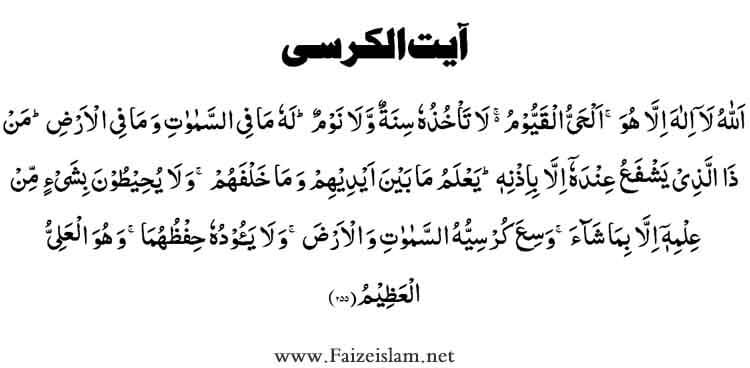Ayat-ul-Kursi
Printed From: IslamiCity.org
Category: Religion - Islam
Forum Name: Quran & Sunnah
Forum Description: Understanding Quranic ayat and Sunnah
URL: https://www.islamicity.org/forum/forum_posts.asp?TID=748
Printed Date: 23 November 2024 at 5:39am
Software Version: Web Wiz Forums 12.03 - http://www.webwizforums.com
Topic: Ayat-ul-Kursi
Posted By: nadir
Subject: Ayat-ul-Kursi
Date Posted: 27 April 2005 at 6:20am
|
Assalaamu Alaikum I would be most grateful if some of you are able to offer me some alternative translations of Ayat-ul-Kursi, as I currently only have one translation (by Muhammad Muhsin Khan & Muhammad Taqi-ud-Din Al-Hilali) at hand, & it goes as follows: Allah! La ilaha illa Huwa (none has the right to be worshipped but He), Al-Hayyul-Qayyuum (the Ever Living, the One Who sustains & protects all that exists). Neither slumber nor sleep overtakes Him. To Him belongs whatever is in the heavens and whatever is on the earth. Who is he that can intercede with Him except with His permission? He knows what will happen to them (His creatures) in this world, and what will happen to them in the Hereafter. And they will never encompass anything of His Knowledge except that which He wills. His Kursi extends over the heavens and the earth, and He feels no fatigue in guarding and preserving them. And He is the Most High, the Most Great. May I also please ask if anyone can verify the following explanation given with the Ayat, in the copy of the Qur�an I posses: (V.2:255). Kursi � literally a footstool or chair, and sometimes wrongly translated as Throne. The Kursi mentioned in this Verse should be distinguished from the �Arsh (Throne) mentioned in V.7:54, 10:3, 85:15 and elsewhere. Prophet Muhammad (SAW) said: �The Kursi compared to the �Arsh is nothing but like a ring thrown out upon open space of desert.� If the Kursi extends over the entire universe, then how much greater is the �Arsh. Indeed Allah, the Creator of both the Kursi & the �Arsh, is the Most Great.
Ibn Taimiyah said in the chapters:
a) To believe in the Kursi
b) To believe in the �Arsh (Throne)
It is narrated from Muhammad bin �Abdullah and from other religious scholars that the Kursi is in front of the �Arsh (Throne) and it is at the level of the feet. [Fatawa Ibn Taimiyah, Vol 5, Pages 54, 55]. Wasalaam nadir
|
Replies:
Posted By: Knowledge01
Date Posted: 13 August 2005 at 5:27pm
| **Bumping this topic up because this is a beautiful ayat** |
Posted By: Moizraza
Date Posted: 29 July 2022 at 2:41am
 Ayatul Kursi Arabic Read More About ayatul kursi
|
Posted By: omar123123
Date Posted: 09 December 2022 at 12:11pm
|
|
Posted By: Rehmanbik
Date Posted: 22 April 2023 at 4:51am
| Thank You |